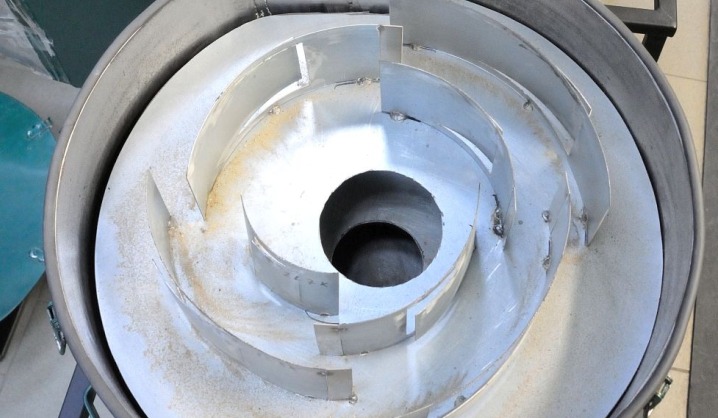- Programmes in English 2025/2026
- Admission 2024/2025 Scholarships
- For exchange students
- Free Movers
- Transfer studies
- Erasmus+ studies and traineeships
- Mentor programme
- Student testimonials
- Accommodation
- Career Services
- Medical Care
- Immigration Regulations
- Leisure and Student Activities
- Useful information
- VILNIUS TECH for Creators of Tomorrow
- Mental and spiritual support
- Representatives Abroad
- Contacts
- Computer Engineering

2014-06-20
VGTU scientists offer a cheaper way of cleaning the polluted air
In order to reduce the air pollution, the researchers of Vilnius Gediminas Technical University (VGTU) developed a multi-channel spiral cyclone, cleaning from ninety five to ninety six per cent of especially fine solid particles from the polluted air. While cleaning the air, the multi-channel spiral cyclone removes from one to ten micron-sized dust particles, which for people, especially working in extremely polluted and badly cleaned premises, may eventually cause lung disease, called pneumoconiosis.
The multi-channel spiral cyclone will be used for air cleaning of boiler rooms, wood processing, paper and furniture production, industry of building materials, agriculture and other polluted surroundings. The innovation has the advantage over other currently used air purifying technologies in the price and performance efficiency ratio: the multi-channel spiral cyclone is almost ten times cheaper than the alternative technologies on the market, achieving the same results.
"Taking caring of environmental pollution and increasing well-being of people, we have developed a much more efficient air cleaning mechanism. The multi-channel spiral cyclone‘s structure is simple, making not only its production, but also its operation and maintenance much cheaper. Currently used air filters also lack behind our cyclone in the operation conditions: our proposed innovation can clean the polluted air even at high temperatures or having high moisture level in the air," - told Pranas Baltrėnas, professor of VGTU Department of Environmental Protection, Faculty of Environmental Engineering.
Based on the data of an environmental protection agency, the concentration of solid particles in the air has increased during the last years: in large cities the concentration grew up to nineteen – thirty eight per cent, as compared to that of 2012. The solid particles’ concentration in the air depends on the season: during the cold season, the amount of solid particles in the air increases because of heating, and in summer, vehicles bring the solid particles up into the air from the surface of the streets. And the industrial enterprises emit the particles during all the seasons.
VGTU experts presented the new technology at the international scientific conference "Environmental Engineering", which brought together participants from twenty countries of the world – the United States, Canada, the United Kingdom, Germany, and others. Currently, there are three multi-channel spiral cyclone versions, created at the laboratory, and the development of their prototypes, adapting them for the industrial manufacturing, is going on further.
After deciding on the ways of improving air purification technology a year ago, the scientists now are already planning to offer the first multi-channel spiral cyclones for the market next year.
The multi-channel spiral cyclone will be used for air cleaning of boiler rooms, wood processing, paper and furniture production, industry of building materials, agriculture and other polluted surroundings. The innovation has the advantage over other currently used air purifying technologies in the price and performance efficiency ratio: the multi-channel spiral cyclone is almost ten times cheaper than the alternative technologies on the market, achieving the same results.
"Taking caring of environmental pollution and increasing well-being of people, we have developed a much more efficient air cleaning mechanism. The multi-channel spiral cyclone‘s structure is simple, making not only its production, but also its operation and maintenance much cheaper. Currently used air filters also lack behind our cyclone in the operation conditions: our proposed innovation can clean the polluted air even at high temperatures or having high moisture level in the air," - told Pranas Baltrėnas, professor of VGTU Department of Environmental Protection, Faculty of Environmental Engineering.
Based on the data of an environmental protection agency, the concentration of solid particles in the air has increased during the last years: in large cities the concentration grew up to nineteen – thirty eight per cent, as compared to that of 2012. The solid particles’ concentration in the air depends on the season: during the cold season, the amount of solid particles in the air increases because of heating, and in summer, vehicles bring the solid particles up into the air from the surface of the streets. And the industrial enterprises emit the particles during all the seasons.
VGTU experts presented the new technology at the international scientific conference "Environmental Engineering", which brought together participants from twenty countries of the world – the United States, Canada, the United Kingdom, Germany, and others. Currently, there are three multi-channel spiral cyclone versions, created at the laboratory, and the development of their prototypes, adapting them for the industrial manufacturing, is going on further.
After deciding on the ways of improving air purification technology a year ago, the scientists now are already planning to offer the first multi-channel spiral cyclones for the market next year.











